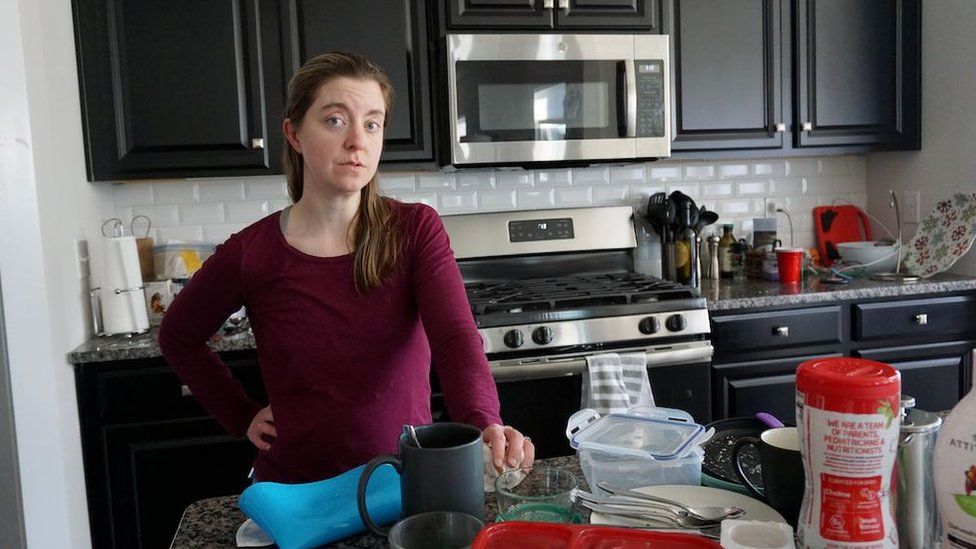-

-
-
Loading

Loading

Nancy Pontius, a 36-year-old Democrat from Pennsylvania, has an unpopular view: she doesn't believe that inflation is a major issue affecting the economy, and it won't influence her vote in the upcoming November election. Although she has experienced financial strain over the past couple of years, such as the increase in gas prices, she recognized that these effects were likely temporary. She voted for Joe Biden four years ago and plans to do so again, with her motivation centered around issues like abortion rather than the state of the economy. This attitude is welcome news for President Biden, whose first term has been plagued by an 18% surge in prices, causing economic dissatisfaction and a decline in political support. Despite the American economy's thriving recovery from the pandemic, domestic opinions have remained largely negative. However, there are signs of change as petrol prices slowly decrease and wages begin to catch up with rising prices. Recent business surveys indicate an improvement in economic sentiment, with Democrats showing similar positivity to 2021, even higher than during the Trump presidency. The Biden administration hopes that this shift in public mood will bolster support for the president as the November election approaches, particularly in crucial swing states like Pennsylvania. However, there are no guarantees, as Biden's approval ratings are currently low due to concerns over immigration, his age, and the conflict in Gaza. Moreover, overall economic sentiment has yet to fully recover from the impact of the pandemic, despite solid growth and historically low unemployment rates. Democratic voters, especially those under 30 years old, are particularly dissatisfied with Biden's handling of the economy. A recent survey revealed that only a quarter of this demographic consider the economy to be excellent or good, compared to 70% of those over 65 years old. Kim Schwartz, a 28-year-old health technician from Pennsylvania who voted for Biden in 2020, expresses disappointment with his economic policies and is skeptical about his ability to improve the financial situation for middle-class and working-class Americans. She is unsure about her vote in the upcoming election. While some individuals have seen improvements in their financial position since 2020, many still face challenges in affording essential expenses. Frustrations are commonly voiced in political polling, with the cost of food, consumer goods, and housing being major concerns. Many Americans feel the need to constantly catch up with rising costs, highlighting the discrepancy between positive economic indicators and personal financial struggles. Republicans, who traditionally hold an advantage on economic issues, have seized on the issue of inflation to criticize Biden. They blame his tax-and-spend agenda for driving up prices and have made it a focal point of their campaigns. Economists suggest that government financial support provided during the pandemic may have contributed to inflation by boosting consumer demand and allowing businesses to increase prices without significant pushback. However, independent and infrequent voters, who prioritize the economy, are more likely to participate in presidential contests. The Biden coalition, comprising Democrats, remains focused on issues like abortion, gun safety, voting rights, and climate change. However, in an election where a few thousand votes in key swing states could determine the outcome, no issue can be ignored when it comes to appealing to swing voters. Critics argue that Biden initially relied too heavily on the national economic numbers to defend his record, which failed to resonate emotionally with voters. In recent weeks, Biden has adopted a more populist tone, criticizing companies for price gouging and sharpening his critique of "extreme MAGA Republican" economic policies. It is expected that the disconnect between economic sentiment and reality will improve in the coming months leading up to the election. Don Cunningham, a veteran Democratic politician in Pennsylvania, believes that the personal experiences of voters, their generational gaps, and how candidates make them feel will influence their votes more than economic issues. While there is a significant number of disillusioned Americans facing a potential Biden-Trump rematch in 2024, even Nancy Pontius, who was once vocal in her support for Biden, plans to take a lower profile, wary of alienating her neighbors.